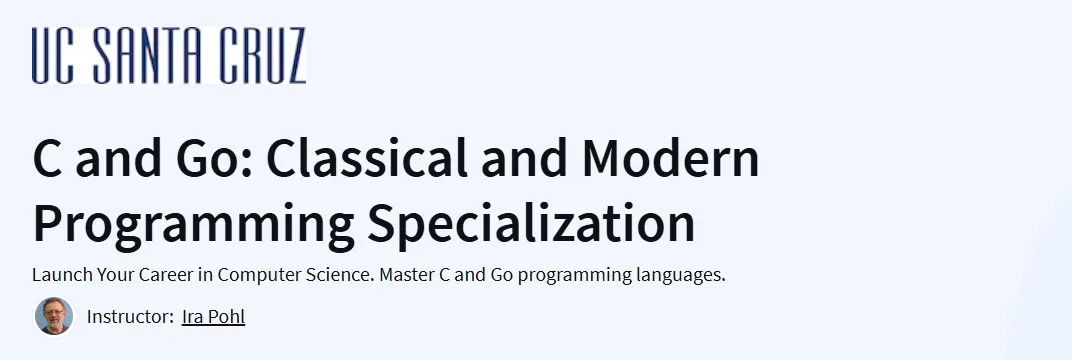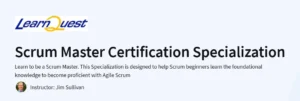What will you learn in this C and Go: Classical and Modern Programming Specialization Course
C Programming Fundamentals: Understand the basics of C programming, including arrays, pointers, functions, storage classes, logic operators, lexical elements, and data types.
Structured Programming in C: Dive deeper into structured programming concepts, enhancing your ability to write organized and efficient C code.
Go Programming Basics: Learn the syntax and semantics of Go, a modern programming language developed by Google, focusing on its unique features and capabilities.
Advanced Go Concepts: Explore advanced topics in Go, preparing you to apply these skills to higher-level problems using AI algorithms and Monte Carlo simulations.
Program Overview
1. C for Everyone: Programming Fundamentals
⏳ 15 hours
Write simple programs in C.
Compile, debug, and run C programs.
Apply concepts related to arrays, pointers, functions, storage classes, logic operators, lexical elements, and data types.
2. C for Everyone: Structured Programming
⏳ 9 hours
Enhance understanding of structured programming in C.
Develop more complex C programs with improved organization and efficiency.
3. Go Programming for Everyone: Part 1
⏳ 17 hours
Introduce the Go programming language.
Write simple Go programs.
Understand Go’s syntax and semantics.
4. Go Programming for Everyone: Part 2
⏳ 17 hours
Explore advanced Go programming concepts.
Apply Go skills to higher-level problems, including AI algorithms and simulations.
Get certificate
Job Outlook
Proficiency in C and Go is valuable for roles in systems programming, software development, and backend engineering.
Understanding both classical (C) and modern (Go) programming languages enhances versatility in the tech industry.
Skills acquired are applicable in developing efficient software solutions and understanding low-level computing concepts.
Explore More Learning Paths
Advance your programming skills with these hand-picked courses designed to deepen your understanding of classical and modern programming languages while enhancing your software development expertise.
Related Courses
C, Go, and C: A Comprehensive Introduction to Programming Specialization Course – Get a thorough introduction to C and Go, building strong foundations in programming concepts and language syntax.
Go and C Programming in Two Successor Languages of C Specialization Course – Explore modern programming approaches in Go and C while understanding their evolution from classical C principles.
Functions, Methods, and Interfaces in Go Course – Master essential Go programming constructs like functions, methods, and interfaces for building scalable applications.
Related Reading
What Is Python Used For? – Discover how Python complements your programming knowledge by offering versatility in application development, automation, and data processing.
Specification: C and Go: Classical and Modern Programming Specialization Course
|
FAQs
- No prior programming experience is necessary.
- Basic computer literacy is helpful but not mandatory.
- The course introduces programming concepts using C and Go from scratch.
- Suitable for beginners and those looking to strengthen programming foundations.
- Gradually progresses from classical to modern programming paradigms.
- Fundamentals of C programming: syntax, control structures, and functions.
- Data structures and memory management in C.
- Introduction to Go programming and its modern features.
- Concurrency, goroutines, and channel communication in Go.
- Comparing classical (C) and modern (Go) programming approaches.
- Includes exercises implementing core C and Go concepts.
- Projects cover real-world programming scenarios using both languages.
- Encourages debugging, code optimization, and performance analysis.
- Step-by-step guidance for building functional programs.
- Helps build a portfolio of programs demonstrating mastery of both languages.
- Prepares for roles like software engineer, backend developer, or systems programmer.
- Strengthens problem-solving and algorithmic thinking.
- Supports work in systems programming, embedded development, and cloud applications.
- Provides a foundation for learning advanced programming languages and frameworks.
- Enhances employability in both classical and modern programming environments.
- Basics of C programming can be learned in 3–4 weeks.
- Mastery of Go and concurrent programming may take an additional 1–2 months.
- Hands-on coding projects accelerate understanding.
- Regular practice and experimentation improve proficiency.
- Completion equips learners with strong foundational skills in both classical and modern programming.





